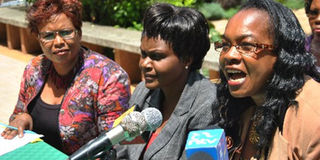Where voters would ‘rattle ancestors’ for entrusting leadership to women

Democratic Space for Women and Empowerment of Kenya [from left] Catherine Kanana, Margaret Matee and Beautrice Mangure during a press conference at Charter Hall, Nairobi, on Friday where they called for inclusion of women in various government positions under the new government.
What you need to know:
- In 1997, Sophia Abdi Nur became the first woman North Eastern region to vie for a political seat in Ijara constituency. She lost.
Where voters would ‘rattle ancestors’ for entrusting leadership to women
Traditional belief and practice that women should not hold positions of power was the ultimate hurdle for female aspirants in the General Election last month.
In the Coast, of all the women who declared interest in different competitive elections, only former Cabinet minister Naomi Shaban was elected to represent Taveta in the National Assembly after beating her closest rival, former MP Basil Criticos, by only 109 votes.
In all, men won 25 of the 26 parliamentary seats in the Coast region.
According to former Pwani University lecturer Erick Chenje Mwachiro most coastal traditional systems of governance do not allow women to take leadership roles.
“For most communities time is not yet ripe for the womenfolk to be voted for elective posts in this region, which still practises patriarchal pecking order when it comes to leadership roles,” he told Sunday Nation in a telephone interview.
Ironically, three male governor aspirants chose female aspirants who are now a heartbeat away from power so to speak after the teams won the elections. Ms Hazel Ezabel Nyamoki will deputise Mr Hassan Joho in Mombasa, while Ms Fatuma Mohamed Achani (Kwale) and Ms Mary Ndiga Kibuka (Taita Taveta) will deputise Mr Salim Mvurya Mgala and Mr John Mtuta Mruttu respectively.
This in a way gives credence to former Kilifi mayor Esther Kache position that lack of resources is the main hindrance to women’s ascent to leadership.
“Without money you cannot run a successful campaign against opponents enjoying support of businesspeople or senior government officials,” she said.
Apart from the County women representatives to the National Assembly which was a women-only affair, all others who sought election as governors, senators or members of the National Assembly flopped. These included Former Central Bank deputy governor Jacinta Mwatela (governorship-Taita Taveta) and senatorial candidates Alice Mbodze (Mombasa) and former Kenya Airport Port deputy managing director Naomi Sidi Kumbatha (Kilifi).
In Meru and Tharaka Nithi counties, female candidates who tried out their hand in politics mainly came from the academic world and women’s organisations. Both counties have never had a woman MP expect in 1975 when Anarita Karimi Njeru was elected to represent South Imenti.
Despite the significant gains brought about by the new Constitution, no woman managed to clinch a single parliamentary seat in the 12 constituencies in the two counties.
In Buuri Constituency, Mrs Kanana Nteere and Faith Kawira vied and lost as did Gladys Kinya (Imenti Central) and Frida Miriti (Imenti South).
In Maara constituency, two women vied and lost while none contested for the Chuka Igambang’ombe and Tharaka parliamentary positions.
Some of the most prominent barriers include cultural and traditional values that have cast women as second class members of the society and which come with negative stereotypes, intimidation and harassment.
According to Meru County Woman Representative Florence Kajuju Gitonga, women suffer marginalisation in leadership and decision making despite the advancements made in recognising a woman’s effectiveness in politics.
Give birth and cook
“Sadly there has been misconception in this region that a woman’s responsibility is to give birth and cook. Thus we have not had effective and visible women representation in the two counties for decades,” she says.
Njuri Ncheke Council of Elders admits that women have been politically marginalised in the region. Secretary-General Phares Ruteere, however, says the two counties have warmed up to embrace opportunities in democracy and leadership which have helped women to find their voices.
“Since the coming into effect of the new Constitution, there is a notable increment of representation by women in leadership positions. It is true that they can make a significant and positive difference when in leadership,” Mr Ruteere adds.
In Nyanza, the Gusii electorate has for decades lived with the reputation of never electing a woman to Parliament since independence.
The only two women from the region who have stepped in Parliament – former Maendeleo ya Wanawake chaiperson Catherine Nyamato and Mrs Wilkista Onsando – were nominated by former President Daniel Moi.
Four women will sit in Parliament but only thanks to the Constitution. In Kisii County Mrs Mary Otara was voted women’s representative while Ms Alice Chae won the Nyamira County seat.
TNA nominated Ms Linet Kemunto, who is blind, to represent people with disability in the Senate while ODM picked party executive director Janet Ong’era for the Senate. Both are from Kisii County.
Co-operatives Development PS Seno Nyakenyanya says cultural beliefs have forced women to keep off politics. She, however, says time is ripe for them to rise up and compete with men on an equal footing.
In 1997, Sophia Abdi Nur became the first woman North Eastern region to vie for a political seat in Ijara constituency. She lost.
In keeping with that tradition, none of the constituencies in Marsabit, Isiolo, Turkana, Mandera, Garissa and Wajir elected a woman MP at constituency level.
Reported by Mwakera Mwajefa, Ken Kimanthi, and Jackline Moraa




